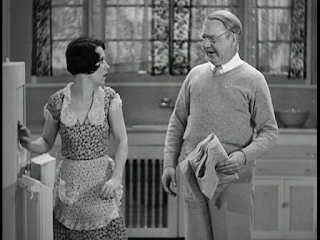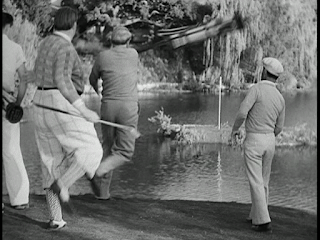Although he's one of the great screen comics, I've found W.C. Fields to be more of an acquired taste than Laurel and Hardy or the Marx Brothers. It's not that he's any less funny than Stan Laurel or Groucho Marx, or that I didn't think his films were hilarious when I first saw them: rather, it's that it took a few films for me to gain a full understanding of and appreciation for his comedy that made it feel richer and more enjoyable. Fields' comedy style is very different from the more straightforward one of Laurel and Hardy: his comedy thrives more on the surreal and absurd, and his films are more cinematically unrefined. Said films have a loose, freewheeling quality, in which the story is a loose framework for a series of gags and routines rather than something that holds the film together. Fields' persona is also less likeable and sympathetic than those of most comedians, even the anarchic, freewheeling Marx Brothers.
The unique qualities of Fields' films are even more pronounced in the two-reel shorts he made during the early '30's, and they're also more willing to defy cinematic norms and subvert audience expectations: indeed some of them, like "The Fatal Glass of Beer" (1933), come across as deliberate exercises in messing with the audience. "The Dentist" (1932), the second of these films, is Fields' wildest and most freewheeling film prior to Never Give a Sucker an Even Break (1941), as well as one of his flat-out funniest.
The subversive nature of the film starts with its opening scenes. We see Fields being served breakfast by a woman who reminds him where his newspaper and reading glasses are, and are naturally led to assume it's his wife. This seems to be confirmed when he smacks her on the ass, only for us to learn that she's in fact his daughter. This is part of a vein of dirty and risque humor throughout the film: characters make a number of comments that can be read as sexually suggestive (one patient tells Fields that she doesn't want him to "fool around with me in the dark"), and when he pulls the tooth of another (female) patient she wraps her legs around him in a way that's very risque. (In fact, the scene was so risque that it had to be excised from the film during its re-release following the implementation of the Production Code.)
Fields' persona is known for being one that isn't particularly warm and cuddly. He's typically a drunken, surly misanthrope, a man who hates children, animals, and most of the people around him. Even in his gentler incarnations he's the kind of man who, forced to split a sandwich with his son, gives him the half without any meat. In this film Field's persona is aggressively unlikeable, the kind of man whose brazen contempt for the world around him makes for comedy gold. (In fact, he's so unlikeable that after this film Fields decided to tone it down a notch.) While playing golf, he conks a man on the head with his ball and throws his caddy in a lake after he misses a shot. He displays open contempt for his patients: when he hears a woman moaning in pain in the lobby, he says, "Oh, the hell with her." While trying to make his shot he forces his caddy to move back and forth from one spot to another. When the poor clod responds to one of these tongue-lashings by responding that he's only standing where he told him to stand, Fields replies, "Never mind where I told you to stand, you stand where I tell you!"
Fields' loopy, surreal humor is one of the fixtures of his work, and in this film it's on hyperdrive. For starters, Fields runs his dental practice out of his house, thereby saving him the trouble of having to build a separate office. When Fields locks his daughter in the upstairs bedroom to keep her from running off with the iceman she stomps on the floor so hard that pieces of the ceiling fall off, and of them falls in a patient's mouth. When Fields uses a buzzsaw on another patient's mouth birds fly out of his large, bushy beard, and Fields picks up his shotgun and begins shooting at them.
"The Dentist" is Fields at his most extreme: it's even more loopy and freewheeling than his typical work, and eschews such niceties as narrative coherence. (What can you say about a film called "The Dentist" in which most of the first half is spent on a golf game?) The real draw in a Fields him is Fields himself: his persona, his style and sensibility, his humor, his surreal loopiness, his sardonic persona and mumbled asides. This is one of the films that presents Fields at his most Fieldsian, and as such is a great display of a truly unique comic mind.









No comments:
Post a Comment